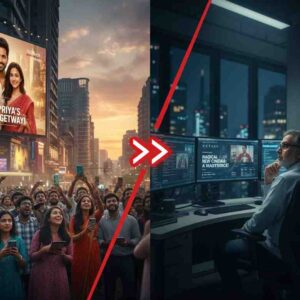Key Metrics (As of Q1 2025):
• Box Office Drop for Major Franchises (2024): MCU titles down 42% compared to 2019 (Source: Box Office Mojo)
• Share of Top-Grossing Original Films in 2024: 36% (up from 21% in 2022) (Source: Comscore Global Report)
• Streaming Originals Growth: Over 60% of new greenlit films on Netflix and Amazon in 2024 were original IPs (Source: Company Reports)
• Franchise Underperformance:The Marvels 2,Fantastic Beasts 4, andFast Xcollectively underperformed by over $500 million globally (Source: Deadline, Variety)
A Saturated Market Faces Resistance
After nearly two decades of franchise dominance, Hollywood is beginning to face the effects of oversaturation. Box office figures from 2024 and early 2025 reveal a declining interest in long-running cinematic universes. Major studio tentpoles—once considered bulletproof—are falling short of commercial expectations.
According to Box Office Mojo, Marvel’s latest entry,Captain America: Brave New World, saw a 45% drop in global opening weekend revenue compared to its 2016 predecessor. Similarly,Fantastic Beasts 4struggled with diminishing audience returns and critical fatigue. The message from viewers is becoming clear: audiences want freshness, not formulas.
Original Content Finds a New Window
In contrast, original films such asPast Lives,Saltburn, andPoor Thingsgained momentum both critically and commercially. The rise of A24, Neon, and Amazon Studios in backing original screenplays has contributed to this creative resurgence.
Streaming platforms are a major catalyst. Netflix, Amazon Prime, and Apple TV+ collectively increased their investment in original films by 28% in 2024, according to their respective annual reports. Notable releases likeLeave the World BehindandAirdemonstrated that mid-budget, character-driven stories can still command attention without sequel potential.
Comscore’s 2024 global media report showed that original IPs accounted for 36% of box office revenue among the year’s top 50 films—nearly double their share in 2021.
Changing Studio Strategies
Studios are beginning to recognize the risks of franchise fatigue. Warner Bros. Discovery announced a recalibrated slate for 2025–2027, reducing dependency on interconnected storylines and exploring standalone narratives. Disney, too, has paused certain Marvel and Star Wars projects, shifting focus to storytelling quality over timeline expansion.
Insiders suggest that the cost-benefit equation is tilting. Franchise entries often require over $250 million in production and marketing, whereas well-crafted original scripts can deliver competitive returns at one-third the budget. Studios like Sony Pictures are now greenlighting more single-title features that bank on strong performances, unique plots, and awards viability.
Audience Demand and Critical Pushback
Part of the shift is driven by changing viewer tastes. Social media sentiment and critical reviews are increasingly skeptical of recycled content and fan service. Independent cinema and international film festivals like Sundance and TIFF have further highlighted the cultural appetite for originality.
The 2025 Oscars reinforced this trend. Films likeAnoraandThe Zone of Interestoutperformed expectations during award season, sparking conversations about the creative exhaustion of franchise filmmaking.
Conclusion: Back to the Script
While franchises remain financially significant, the pendulum is swinging back toward originality. For the first time in years, studios are betting on writers and auteurs over established IPs. This doesn’t mark the death of the franchise—but a rebalancing.
With audiences demanding novelty and authenticity, Hollywood’s future may lie not in sequels and spin-offs—but in the boldness of a blank page.










